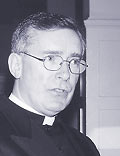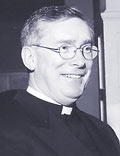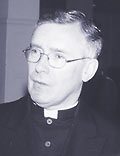 |
 |
|||||
 |
 |
 |
 |
 |
||||||||||
 |
 |
 |
||||||||
| Msgr. Francis Mannion: “The biggest challenge is to celebrate
the rites we have with as much dignity and spiritual depth as
possible.” Catholic New World photos by Sandy Bertog
New Liturgical Institute to educate priests, laity
Msgr. M. Francis Mannion is preparing to open the Mundelein Liturgical
Institute at the University of St. Mary of the Lake next fall.
The institute will offer graduate level education in liturgy to
priests and lay people from around the world. A priest of the
Diocese of Salt Lake City since 1973, he spent the last 14 years
as rector of the Cathedral of the Madeleine. He also is a founder
and president of the Society for Catholic Liturgy. Msgr. Francis Mannion: What qualified me, I suppose, is the fact that Cardinal George
called me. He’s the one who determined I was qualified for the
job. I think he was looking for somebody who had an academic background
in liturgy, who has also significant pastoral experience, and
somebody that he thought he could work with. Those are the three
elements that came into play. MFM: The institute exists to promote the liturgical life of the church,
through an academic program, publications, research and conferences.
We will offer one diploma and two degrees: a graduate diploma
in liturgy, which will be a substantive graduate program lasting
for nine months; then we will have a master of arts program and
an STL, the license in sacred theology. These programs are meant
to produce liturgical directors for parishes, for dioceses, and
also to prepare people to teach in seminaries, to continue their
education at the doctoral level, and so forth. The clientele will
be laity, clergy, men, women, so we expect to have quite a diverse
body of people in attendance. MFM: We expect and, in a certain way, hope to start small. If we
have half a dozen students to start with, that will be satisfactory
from my point of view. There are many people expressing interest,
but I think we want to see how the first year goes. Then, after
that, we think the numbers will increase. MFM: The whole country. The institute is sponsored by the archdiocese,
and obviously, the principal beneficiary of its programs should
be the archdiocese, but it is a national, even international project.
We have applications from Africa, from India, from Asia and from
the British Isles. MFM: The institute is ready to respond to the needs of any institution
in the diocese that calls upon its services. We have no mandate
to do anything other than run the institute and put into effect
its various programs. Any program that asks for our assistance—we
will provide it if we are in a position to do so. MFM: Oh, sure. People have thought of the institute as some great plot to undo the Archdiocese of Chicago, and there is no such plot. If such a plot existed, it would be rather unrealistic. I think people have wondered what the institute is all about, and if it has a hidden agenda. It doesn’t. Its agenda is all in print (in the promotional brochure). One of the priests (at the Presbyteral Council) asked if I was
going to be the watchdog for the liturgy of the whole archdiocese.
I said no, that’s not my task. That’s the job of the bishop, or
the cardinal, and his own liturgical staff. It’s not my job at
all. It would be an impossible job. That’s just not in the cards. MFM: We cover the seven sacraments, all the rites of the church,
the music, art and architecture and look at all of these in their
historical, cultural and practical contexts. … The people who
come out would also be able to educate other people. We want to
make sure people are not only knowledgeable, but also can be of
service in their parishes, in their dioceses and in the religious
community. MFM: I think we need to take what we’re doing and do it better. The whole agenda of looking backwards to me is very unrealistic and would not serve the church at all. By the same token, I would say we don’t need to keep changing our rites and changing our texts and changing our prayer. What we need to do is take what we have, which is the product of Vatican II, and put that into effect with as much style, as much substance, as much care as possible. The biggest challenge is to celebrate the rites we have with as much dignity and spiritual depth as possible. ... I think we need to improve the way in which priests preside, we need to improve the quality of homilies, the quality of lay ministry needs a lot of work, the music, art and architecture need to be brought to a higher level than they have achieved in recent decades. Front Page | Digest | Cardinal | Interview |
||||||||||